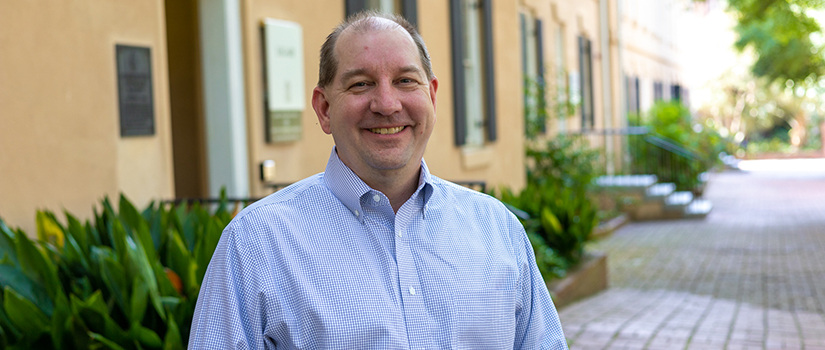As director of the Center of Integrative and Experiential Leaning, Pierce hopes to make opportunities for engagement more accessible and equitable for all students.
Charlie Pierce keeps busy. He’s long believed that co-curricular involvement is crucial
for student learning and personal growth, and ever since high school, he’s been determined
to put that into practice. During his undergraduate education at the University of
New Hampshire, he took advantage of a research opportunity at Cornell, held several
civil engineering internships, served on his campus activities board, became president
of the student chapter of the American Society of Civil Engineers, and helped found
a chapter of a fraternity.
As a student, Pierce didn’t have the words to voice how his various co-curricular experiences built upon each other to contribute to his future career as an engineer. Now, he knows that there’s a name for his approach to education: integrative learning. His passion for sharing these experiences with students led to his eventual involvement in the Center for Integrative and Experiential Learning at the University of South Carolina.
“The challenge is that some students struggle with finding time, finding resources, knowing how and where to engage. They need help, they need support, they need resources.”
Charlie Pierce
Now, as director of CIEL, Pierce is ready to expand his reach at the university and make opportunities for engagement more equitable and accessible for all students. “I have always been a strong student advocate, and I’ve tried to demonstrate that in as many ways as possible, through my teaching, supporting students through undergraduate and graduate research. But there is only so much you can do in that role,” says Pierce, who is also an associate professor in the College of Engineering and Computing. In Pierce’s new position, he envisions an expansion of what he will be able to do to support experiential and integrative learning.
CIEL boasts two signature programs, Graduation with Leadership Distinction and Experience by Design, that the CIEL team leverages to improve campus access to integrative and experiential learning opportunities. The GLD program recognizes students for significant leadership and co-curricular involvement in one of five pathways, such as professional and civic engagement. Currently, around 7 percent of UofSC students graduate with the distinction; Pierce is hoping to see the program serve 10 percent of graduating students in the coming years.
Experience by Design is the culmination of CIEL’s most recent Quality Enhancement Plan, and its goal is to allow the entire student body at UofSC Columbia and the Palmetto College campuses to benefit from integrative and experiential learning free of barriers. The university offers a host of meaningful opportunities to engage, and Pierce wants students to take full advantage of what is available to them.
Pierce explains, “The challenge is that some students struggle with finding time, finding resources, knowing how and where to engage. They need help, they need support, they need resources.” Experience by Design aims to provide all students with opportunities to meaningfully engage. Amber Fallucca, the associate director of CIEL and director of the Quality Enhancement Plan, says that the program will intentionally support students with lower rates of engagement, graduation and retention.
Beyond maximizing the potential of CIEL’s signature programs, Pierce is eager to promote his personal goals for CIEL. One of his priorities is increasing faculty engagement with CIEL.
“Faculty have such an essential role in increasing student engagement. If we want more students to engage, we need more faculty supporting student engagement,” Pierce says.
Pierce also has a goal of spotlighting CIEL’s work on a national level. He is proud of the work CIEL has done in fostering integrative and experiential learning, especially through the GLD program, and he is committed to sharing this knowledge with other universities by hosting conferences. He envisions UofSC emerging as a leader in the field of integrative and experiential learning by leveraging opportunities to share the university’s successes.
Lauren Epps, who is the CIEL assistant director and is largely responsible for overseeing GLD’s day-to-day functions, agrees with this assessment. “We’re in a really good place now where we can serve as a leader in this field of integrative and experiential learning,” she says. “We have a lot to offer, and I’m really excited about the opportunity.”
Pierce is grateful for the opportunity to serve as CIEL’s new director, and he credits his team with making it possible to effectively pursue the ambitious goal of increasing student, faculty, and staff engagement with integrative and experiential learning. He’s committed to seeing a more involved student body, but more importantly, to fostering a culture of engaged learners who approach their experiences within and beyond the classroom with a desire to reflect and grow.
“I feel strongly about this value of engagement because I lived it,” Pierce says. “I wish that when I was a student, we’d had such a center that had these kinds of programs because I would have benefited even more in terms of trying to connect one experience to another, how I learned from experiences, how they were preparing me for grad school. These are things I realized decades later more than I did in the moment.”
